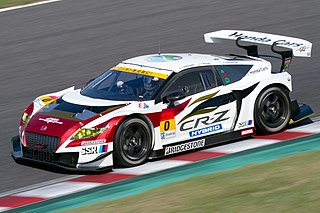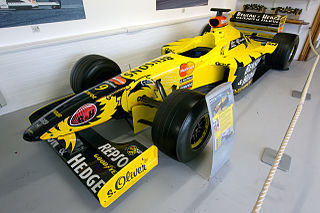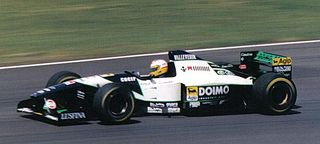
Takuma Sato, nicknamed "Taku", is a Japanese professional racing driver. He competes part-time in the IndyCar Series, driving the No. 11 Honda for Chip Ganassi Racing. Sato is a two-time winner of the Indianapolis 500, having won the event in 2017 and 2020. He was the first Asian driver to win the Indianapolis 500, and the twentieth driver to win the race more than once. Before winning the Indianapolis 500, Sato became the first Japanese-born driver to win an IndyCar Series race when he won the 2013 Grand Prix of Long Beach.
Jordan Grand Prix was a Formula One constructor that competed from 1991 to 2005. The team was named after Irish businessman and founder Eddie Jordan. The team was based at Silverstone, UK but raced with an Irish licence.

Michele Alboreto was an Italian racing driver. He was runner up to Alain Prost in the 1985 Formula One World Championship, as well as winning the 1997 24 Hours of Le Mans and 2001 12 Hours of Sebring sports car races. Alboreto competed in Formula One from 1981 until 1994, racing for a number of teams, including five seasons (1984–88) for Ferrari.

The 1992 Brazilian Grand Prix was a Formula One motor race held at Interlagos on 5 April 1992. It was the third race of the 1992 Formula One World Championship.

The 1992 Australian Grand Prix was a Formula One motor race held at Adelaide on 8 November 1992. It was the sixteenth and final race of the 1992 Formula One World Championship.

The 1995 Australian Grand Prix was a Formula One motor race held on 12 November 1995 at the Adelaide Street Circuit, Adelaide. The race, contested over 81 laps, was the seventeenth and final race of the 1995 Formula One season, and the eleventh and last Australian Grand Prix to be held at Adelaide before the event moved to Melbourne the following year. This would also prove to be the last Grand Prix for Mark Blundell, Bertrand Gachot, Roberto Moreno, Taki Inoue and Karl Wendlinger.

The 1995 FIA Formula One World Championship was the 49th season of FIA Formula One motor racing. It featured the 1995 Formula One World Championship for Drivers and the 1995 Formula One World Championship for Constructors, which were contested concurrently over a seventeen-race series that commenced on 26 March and ended on 12 November. Michael Schumacher won his second consecutive Drivers' Championship, and Benetton won the Constructors' Championship, the first and only Constructors' title for the Benetton team.

Satoru Nakajima is a Japanese former racing driver. He is a five-time Japanese Top Formula champion, and was the first full-time Japanese Formula One driver. Accordingly, he is responsible for several firsts for Japanese drivers in Formula One, including being the first to score championship points, and being the first to record a fastest lap.

Mugen Motorsports (無限), legally known as M-TEC Company, Ltd., is a Japanese company formed in 1973 by Hirotoshi Honda, the son of Honda Motor Company founder Soichiro Honda, and Masao Kimura. Mugen, meaning "without limit", "unlimited" or "vast", is an engine tuner and parts manufacturer that manufactures OEM parts such as body kits and sports exhausts for Honda. Despite the family relationship, however, Mugen is not, and has never been, owned by Honda Motor Company; Mugen owner Hirotoshi Honda has been the biggest shareholder in Honda since his father's death in 1991.
The Japanese automobile manufacturer Honda has participated in Formula One, as an engine manufacturer and team owner, for various periods since 1964. Honda's involvement in Formula One began as a full team and engine entry in the 1964 season, and in 1965 they achieved their first victory at the Mexican Grand Prix. After further success with John Surtees, Honda withdrew at the end of the 1968 season due to difficulties selling road cars in the United States and Honda driver Jo Schlesser's fatal accident.

The Jordan 198 was the Formula One car with which the Jordan team competed in the 1998 Formula One World Championship. It was driven by 1996 World Champion Damon Hill, who had moved from Arrows, and Ralf Schumacher, who was in his second season with the team. Test driver Pedro de la Rosa also drove the Jordan 198 during test sessions in 1998.

The Prost JS45 was the Formula One racing car with which the Prost team competed in the 1997 Formula One World Championship, and the first Prost-badged car following Alain Prost's acquisition of Ligier in February 1997.

The Minardi M195 was a Formula One car designed by Aldo Costa for the Minardi team. The original M195 was used in the 1995 Formula One World Championship while an updated version, the M195B, was used in the 1996 Championship. Both versions were powered by the Ford ED 3-litre V8 engine. Across its two seasons of racing the car was driven by Italians Pierluigi Martini, Luca Badoer, Giancarlo Fisichella and Giovanni Lavaggi, Portuguese Pedro Lamy and Brazilian Tarso Marques.

Footwork Arrows was a British Formula One motor racing team which competed from 1991 to 1996. Japanese businessman Wataru Ohashi, who was the president of Footwork Express Co., Ltd., a Japanese logistics company, began investing heavily in the Arrows team in 1990, the deal including requiring the cars to display the Footwork logo prominently. The team was officially renamed Footwork in 1991, and secured a deal to race with Porsche engines. Results were poorer than expected, and after just six races, Footwork dropped the Porsche engines and continued with Hart-built Ford engines.

The Footwork FA14 was a Formula One car with which the Footwork team competed in part of the 1993 Formula One season. It replaced the FA13B, a revised version of the previous year's FA13 chassis that had been used for the first two races of that season. It was driven by veteran Derek Warwick, returning from a two-year sabbatical, and Aguri Suzuki, retained from 1992.

Équipe Ligier is a motorsport team, best known for its Formula One team that operated from 1976 to 1996. The team was founded in 1968 by former French rugby union player Guy Ligier as a sports car manufacturer.

The Tyrrell 020 was a Formula One racing car designed by Harvey Postlethwaite and George Ryton for Tyrrell Racing and raced during the 1991 season.
Honda has been competing in a variety of racing series through the years, including Formula One, IndyCar, touring car racing, sports car racing and MotoGP. Currently they are involved in Formula One, MotoGP, Super GT, Super Formula, IndyCar, IMSA, BTCC, TC2000, Formula 3, Formula 4, off-road, WSBK, EWC, MXGP, TrialGP and various different GT3 and TCR series. All of Honda's motorsport activites are managed by Honda Racing Corporation (HRC).

The RA series of 3.5-litre and 3.0-litre, naturally-aspirated, V10 racing engines were made by Honda to compete in Formula One racing; between 1989 and 1990, and then again between 2000 and 2005. Between 1992 and 2000, the engines were also made by Mugen Honda. The customer engines were used by McLaren, Arrows, Lotus, Ligier, Tyrrell, Prost, and Jordan.

The HB is a series of 3.5-litre, naturally-aspirated V8 Formula One racing engines, designed, developed and produced by Cosworth, in partnership with Ford; and used between 1989 and 1994. The customer engines were used by Benetton, Fondmetal, McLaren, Lotus, Minardi, Footwork, Simtek, and Larrousse.
















